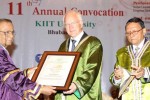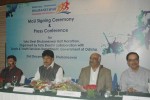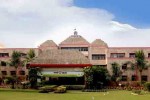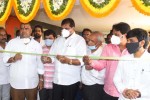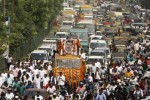Odisha Channel Bureau
Bhubaneswar: The World Toilet Day, 2021 set in the backdrop of the pandemic and the growing threat of disaster caused by climate change, the call for “valuing toilets” is as much as about having basic access as having climate-resilient sanitation. While marking the day on November 18, Bhubaneswar Municipal Corporation (BMC) and Centre for Advocacy and Research (CFAR) thought it befitting to salute all the social catalysts who have over the last few years made safe sanitation – infrastructure, accessibility, dignity and safety of all – a core issue stressing on sanitation value chain and leaving no one behind.
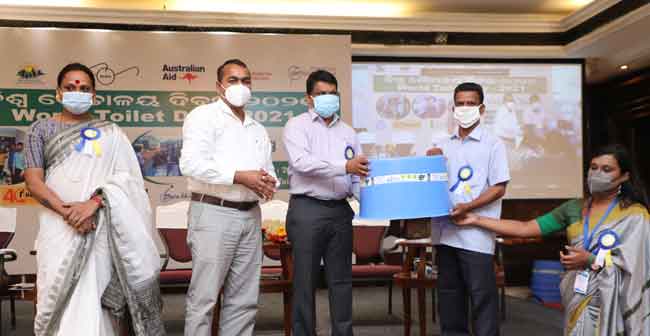
In the introductory address, Samir Ranjan Dash, State Lead, CFAR urged all stakeholders to use the World Toilet Day to renew and strengthen their commitment towards safe and inclusive sanitation. “From the beginning, our concern has been to empower community and groups with special needs-disabled, transgender, elderly, urban poor-to voice their concerns and be part of the solution and today, when we are observing the fourth World Toilet Day much has changed. With the virtual launch of the Saniwall in 12 wards we are entering into a new phase of collaboration between BMC and the urban poor community.”
In his opening address, Suvendu Kumar Sahoo, Deputy Commissioner stated that BMC is planning to construct 67 new public/community toilets in 67 wards and urged the community to be part of the process of scaling up access to toilets. He went on to say: “We will be addressing all grievances big and small which come to us and also have five mobile toilets and will deploy them in areas where there are no facilities.”
Responding to the opening address by Sahoo, Meera Parida, Founder, SAKHA, Member National Council for Transgender Persons, in her special address stated that “CFAR has made it possible for us to have a very good partnership with Bhubaneswar Municipal Corporation, so that we ensure that No One is Left Behind. We request Bhubaneswar Municipal Corporation to make trans-friendly toilets in the state. Our signage campaign for trans-inclusive toilets should be scaled up and the signage of trans-women with women and trans-men with men be displayed across public/community toilets so that we secure recognition and dignity that we are entitled to.” After Andhra Pradesh, Odisha stands second in opportunities for transgender persons, she added. The movement for securing transgender rights is only six-year-old as it started when the NALSA Judgment on Transgender Rights was declared by the Supreme Court of India,
While inaugurating the ‘Saniwall’ virtually in five Wards, Laxmikanta Jethi, Additional Commissioner, said that “CFAR and the community representatives have done a very remarkable job of helping us to set up the Saniwall as it will mirror all the problems and achievements so that we not only construct sanitation facilities but also address grievances and change behaviour. On World Toilet Day we should take practical steps, implement our commitments and make a clear pathway and the city must lead in the providing safe sanitation to all,” he added,
In the spirit of inclusive sanitation, twelve SATO-manufactured toilet pans were conferred to persons with disabilities, elderly and transgender persons by Additional Commissioner and Deputy Commissioner, BMC and Meera Parida, Member, National Council for Transgender Persons.
In her concluding address, Akhila Sivadas, Executive Director, CFAR, said that, “the time had come for BMC to recognize representatives of Single Window Forum and Community Management Committee as a Resource team that will collaborate with BMC and government in not only identifying communities without access to services and linking them to it but also in galvanizing the community to take ownership and its share of responsibility in changing behaviours and in safeguarding the services”.
On inclusive sanitation, Swagat Jhankar-Mallick, disability activist, CFAR asked as to when it will be possible to ensure full-fledged access to sanitation for persons with disabilities, as he felt that much needed to be done on this issue.
Agreeing with this, Sanyashi Behera, DSSO, SSEPD stated, “Many urban poor disabled persons do not have space so it is difficult to make toilets for them. Community toilets do not have options of wheelchair and ramps. It costs 25% more for making disable-friendly toilets. According to the Right of Persons with Disabilities Act, they have a legal right to disable-friendly toilets. But we do not have budget allocations for these special needs. Due to the pandemic disabled people face great difficulty when accessing toilets so we demand that an extra 25 percent is provided to those who have space to make toilets.”
Reflecting about the challenges faced by the elderly, Bharati Chakra, HelpAge India, said that, “along with accessible, affordable toilets, the elderly need emotional, empathy, care and support”.
Sharing their experience ten Single Window Forum members from nine wards pointed out their concerns. Bharati Dakua, Single Window Forum, emphasized the need for “community involvement in household waste segregation and safe mechanised desludging on subsidised rates for informal settlements.”
The event was attended by representatives from community, civil society, development partners, media, officials and sanitation experts of Bhubaneswar.



